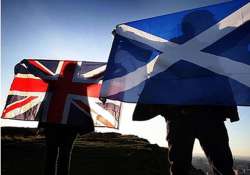Glasgow: When the campaign to keep Scotland in the United Kingdom launched a recent TV ad, the spot went viral — but for all the wrong reasons.
In a kitchen, a woman complains that while her husband can't stop talking about the independence referendum, she doesn't have time to think about voting because she's too busy with housework.
Within hours, spoof videos appeared online, mocking the perceived sexist tone. "The tone of the whole video was completely outdated, sexist and insulting to women," said Sandra Geddes, a 33-year-old office worker who said she plans to vote no on independence even though she was angered by the commercial.
In the battle of the ads in Scotland's independence debate, the Yes camp is scoring the most points — and that may be a factor in the surge that has given it a chance of winning on Sept. 18 after months trailing far behind. While the "Better Together" campaign has been derided for old-fashioned, even patronizing ads, the breakaway side has engaged voters with a slick and humorous campaign that presents a dynamic picture of Scotland.
The pro-independence camp recently won hearts with a poster of a baby's hand in the tender grip of a parent with the slogan "Scotland's future in Scotland's hands." While it appealed to a sense of family, it didn't smack of conservative "family values" as some of the No campaign's ads are seen as doing. Critics claim pro-unity posters bearing messages such as "we love our kids, we're saying no thanks" are offensive for implying Yes campaign supporters don't love their families.
The Yes camp has also effectively targeted younger voters — shown in surveys to lean toward independence — with an innovative ad called "My Generation" that portrays a vote for independence as a bold, decisive step.
"Most of the wit has come from the Yes side," said graphic designer and cartoonist Greg Moodie. "I haven't seen much from the No camp; I think it's because 'Better Together' is really the voice of the establishment and it's been pretty stuffy and pompous."
As the battle to decide the future of Scotland and the U.K. enters its final week, both sides have launched some of the largest ad campaigns in Scottish political history. Millions of pounds (dollars) have been spent to produce countless TV commercials and advertising posters.
But the battle has moved beyond traditional paid media advertisements, with an explosion of uncoordinated social media activity. The pro-independence campaign is seen as being faster and more adept at creating buzz online.
"Everybody talks about President Obama's 2012 election as an example of a successful social media campaign but while that was great from an officially orchestrated viewpoint, I don't remember seeing as much participation from ordinary members of the public," said Mike McGrail, a Digital Marketing and Social Media expert from Edinburgh who says he is undecided on which way to vote.
The use of Facebook, Twitter, YouTube and other platforms, he said, "has been really incredible in terms of the volume and the cleverness of it."
Latest World News

